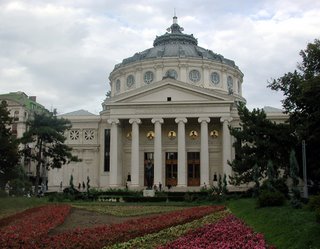Prior to leaaving for Romania, we were warned about pickpockets, and especially gypsies -- plus taxi scams, and another scam involving a fake plain clothed policeman who tries to extort money out of unwitting strangers. I'm happy to report that we didn't experience any of that, even though I did some walking around in Bucharest by myself.
I was expected an ugly city, ruined by Communism's concrete block-style awful architecture -- and I thought the real trip would begin once we headed into the countryside.
That wasn't true. I enjoyed the city. Bucharest was once called, "The Paris of the East", and when you get to see more of it, you understand why.
First of all, it's a very green city -- with many more trees than any American city I can think of -- especially San Francisco! There are wide triple lane boulevards lined with trees not only on both sides, but also lining the two center lanes.

Concert Hall
There are many elegant old buildings, mansions, and embassies. Parks with ponds and small lakes provide places to enjoy the outdoors. One long stretch of street connects two main squares with a whole series of beautifully carved stone fountains that lead up the center to one huge celebration of water surrounding one of the two large squares. It's dramatic and spectacular.
I walked around in a neighborhood close to our hotel, and immediately, I sensed a true 'neighborhood' feeling, where people knew and greeted each other. The elderly were treated with great respect, and weren't ignored as second class citiizens. There wasn't much urban fast paced anxiety. I didn't notice frantic, rushing people, driving with a cell phone up to one ear (well, maybe on occasion).
Corner stores are flourishing establishments (remember, there are no chain stores). Of course, stray dogs appear on every block (see Part 2).
Clothes seemed to be a distant mimic of what we wear here in the U.S. There were lots of cheap attempts at designer jeans, and T-shirts that had English phrases on them that fell short of the clever slogan that the designers thought they were splashed on our clothes. I'd see T-shirts boasting, "Fast Engine, Most Flavor, Be It's Life!" Sometimes, the mangling of the phrases were so bad, that I didn't even try to figure out what the boasting was about. "America Sport 4501 Left Drink Over", for example.
Jeans ran the whole gamut: patched, embroidered, beaded, frayed, torn, studded, bleached, overdyed, and any or all of those combined -- and usually the designs were in odd places: words stitched across the seat, or wrapped 3/4 around the hips before trailing down a leg. But the materials weren't of the best quality -- and no one seemed to mind.
That was Bucharest. The soul and strength of Romania, however, lies in its peasants, the countryside, and its folklore, traditions, and crafts. The peasant folk define the country and their traditions anchor it down, allow the country to maintain its ways, despite Romania's turbulent history.
Religion has a stronger hold here than anywhere else I've ever traveled to. Taxi drivers make the sign of the cross as they drive past a church. No matter what age, anyone entering a Romanian Orthodox church readily exhibits their faith. They stand in awe and stop for deep prayer in front of religious icons. Every single Romanian appeared genuinely devout -- with no exceptions -- including teenagers! 

Crosses appear everywhere: along roads inside small traveler's shrines, and .on top of mountain peaks. Most houses have small ornamented metal crosses at each end of the roof. a number of handmade wooden crosses are nailed onto a particular tree after the death of someone in the community as a memorial.
I watched a couple bring their new car to a monastery to be blessed by the priest. With all the car doors and trunk open, the priest circled the car twice, praying and dousing it with holy water, as the couple stood, heads bowed in prayer, and holding long candles. The priest blessed the engine, the transmission, each tire, every door, the brakes, each seat, the windows, the steering wheel, and even the glove compartment. Our guide told us that this was to help keep the car out of accidents. After thanking the priest, and kissing the hem of his mantle, they drove away. What would've happened if they backed out too far & hit a tree right then and there? I wonder what the reaction would be...
In some ways, the church has kept Romania from becoming more socially liberal - for example, although homosexuality is legal, it's tolerated, but frowned upon. Recent attempts at gay pride parades in Bucharest have resulted in major shouting confrontations.
Traditions are not taken lightly; weddings and funerals have more ritual and significance than we're used to. Wedding celebrations last for about 3 wild days of partying, while funerals and mourning the deceased can stretch on with rememberances marked at intervals for a full year or more. As in much of Europe, Easter is both a holy day and a celebration of spring and life -- but it doesn't begin months early with merchandising in stores. Important days are marked with ritual. Holidays aren't bought in stores, they're created by hand and heart.
I saw people brought together as a result, not in their own cell phone/computer/iPod/Game Boy worlds. People were far more in touch with the real world around them.


No comments:
Post a Comment